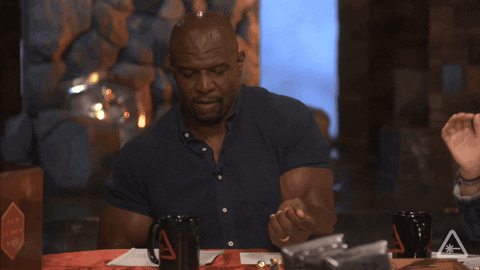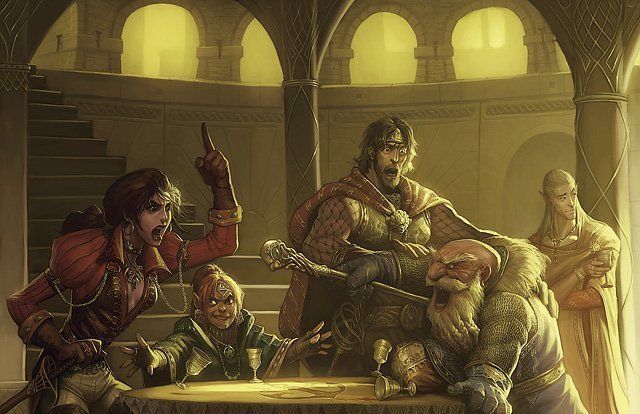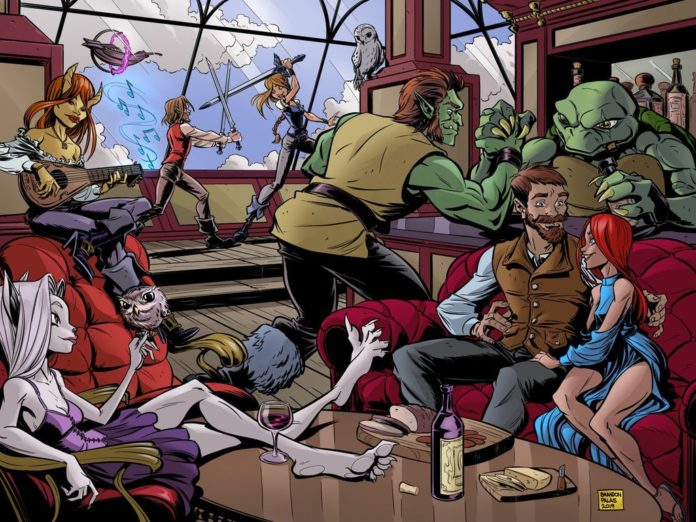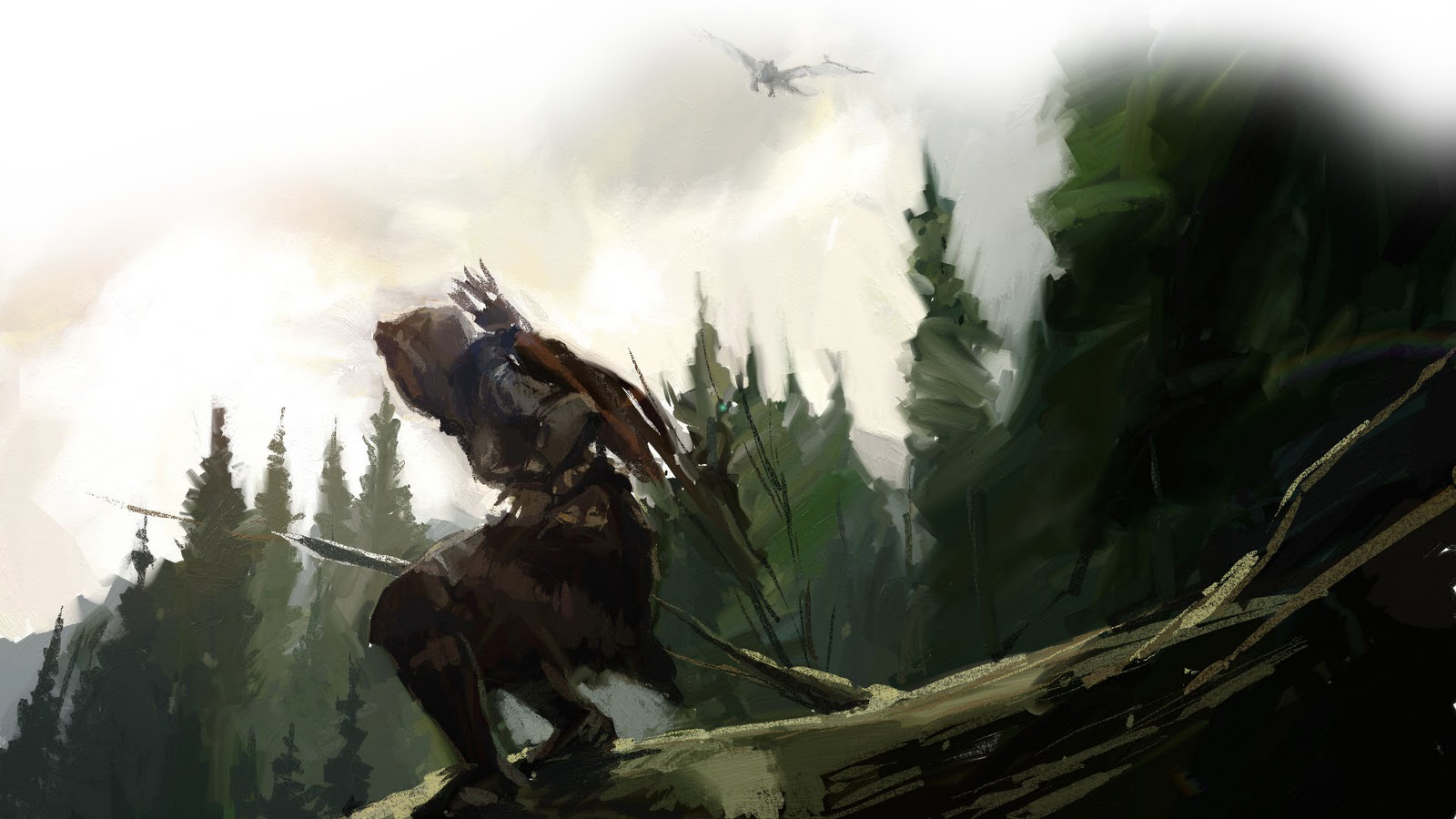…So a proper article would begin with an overview of the original Skill Challenge (a mechanic introduced in 4E), maybe talk about some popular variations (ref. Matt Coville:)…but they’re only paying me for 1,500 words!
What is a Skill Challenge?
When your PCs have a goal that they should be able to accomplish without combat, they can instead work as a group to accomplish said goal using their skills.
Each player in a “round” rolls a skill check, and if they hit a DC that you guesstimate (use the rules for this in the DMG, Chapter 8, if it helps) it counts as a success. If not, it’s a failure. Individual successes or failures can have significant impacts. And if there’s enough “success” relative to “failure” by the end, the PCs reach their goal.
Done right, you don’t really have to PLAN a Skill Challenge. You can ask PCs what individual steps they want to take towards the larger goal, then assign skill rolls with approximated DCs for those sub-tasks. They feel empowered and are encouraged to roleplay more than they might otherwise. You can also have all kinds of silly things happen depending on their successes/failures and have a bit of a break from more traditional combat.
[Related: 7 Tips and Resources For New Dungeon Masters]
So, how do I do a Skill Challenge right?
I think an example will work best:
Your PCs want to find a box of donuts that has magically (POOF!) disappeared.

Ask them how they think their characters would go about trying to find magically disappeared donuts in your game world. Depending on your group, you should get someone asking about rolling for Arcana, or even a more martial character that just wants to look around town manually.
Note how none of this is combat (hopefully).
Okay, you, DM, can condense this down to: “They want to go on a search,” and to make it something longer and more substantive, you can go for a Skill Challenge.
Spend a second explaining the Challenge to PCs:
“Each one of you has to take a turn. On your turn, you’re going to tell me what your character wants to do, and either I’ll tell you what skill to roll or you can pitch me an idea of what skill you want to roll and justify it to me. I’ll tell you if you succeed or not. There will be consequences either way. MUWAHAHA!”
You should get some strong, obvious responses. In our example, “I want to do Arcana!” would be one.
However, more martial characters might be at a loss…and it’s in this moment of anxiety that roleplay can arise. ((…she said in a strikingly sage voice…))
Tell players that they can use their best (or any) skills as long as they can justify it to you.
You will be genuinely (and pleasantly?) surprised at how easily your players will be able to do things like justify an Acrobatics roll to deliver a baby (“I untangle the cord!”). In our example, martial characters could just search street to street.
Why not?
Have them do Investigate. Have them ask random NPCs if they’ve seen pastries matching a description (Intimidate, Persuasion…which aren’t obviously useful skills here).
Yes, this invites absurdity…but “justification” is part of the fun and encourages players to tell a story in collaboration with you — a story that isn’t just your voice, but full of ideas that otherwise wouldn’t have occurred to anyone.
To this end, I usually give players space (and some time) to come up with their own ideas. However, if someone really gets stuck, I might prompt them by asking for a description of what they want to do (as if this was a book or movie).
Then I’d assign a skill for them to roll. Or I might do some improvising of my own (dun! dun! dun!) and ask them what skill they want to use. Then, I’d give them some ideas for that skill that occur to me.
I’ve seen these approaches work more times than I can count.
(Perception check: You see a sign saying, “Free Donuts in Treehouse”.)
…But if they’re still at a loss, give them the option to Aid other characters or to use things that aren’t skills. For example, another PC could roll an Arcana, too.
If they meet your DC, they give Advantage to the “main” PC for the roll. A more martial character that has a masseuse background could give other characters relaxing back massages as they research, granting them Advantage (a.k.a. “justified, absurd roleplay”). PCs might also use items or spells they have, and those would count as successes as well.
The point is to allow everyone to feel useful and be creative.
Complications…?
Our example could end after one “round”. The spellcasters cast a spell. The martial characters find a donut somewhere…but that’s too short! Instead, at each step, the DM should consider what kinds of complications PCs might encounter as they succeed/fail:
A successful Arcana might reveal a special donut-finding ritual — that has specific words said in a specific way while participants do a dance inside of a pattern drawn on the floor using special ritual components. Each of those parts could require certain skill checks…

(Terry uses “Sleight of Hand” to pull something out of Vacation Terry’s Fanny Pack.)
And don’t let the “non-combat” nature of Skill Challenges fool you — they can contain mini-combats if you want. Maybe research at the local library reveals a local, donut-stealing cryptic. PCs might need to find it (Survival?) and defeat it…
Likewise, as more martial characters search around town, maybe they run into hostile NPCs (from old misers to old rival pickpockets) who they must contend with. Maybe one of them forces PCs to solve a puzzle before returning their donuts (comics-style)?
Coming up with these complications can keep the Challenge going.
Consequences and Outcomes?
In 4E, there was a rule about having “X number of Successes before Y number of Failures.” In 5E, you could still do something similar, predetermine values for X and Y. However, there’s a lot of support for just going until X number of Successes (exact number is at DM’s discretion) or until there are 3 Failures.
Personally, I’m even more holistic than this. Skill Challenges tell a finite part of a larger story: how a specific investigation was done, the “blow-by-blow” of a specific chase, etc.
While I can throw in all the complications I want, there’s a certain natural point at which a sub-story ends — whether in Success or Failure. So, I tend to let Challenges run until then.
I track the number of Successes to Failures and go with whichever has the higher value.

(Note: I can allow for more mixed results if the numbers are about equal, or I can pick the side that numerically lost, but makes more narrative sense. For example, if players technically get one more Failure than Successes, but were especially clever at some key points, I might just give them Success. I’m the DM; I’m allowed to do that.)
Just keep in mind that the more rolls (Successes required), the harder the Challenge.
Also, while overall Success may be obvious, try to have reasonable ideas for what overall Failure looks like. It (probably) isn’t a “TPK,” but it might be not getting some key information that would make a task easier or having to fight extra enemies in the next combat….
Oh, and you can also use individual Successes or Failures as points of fun:
Did the spellcasters mess up their ritual? Their ears become donut-shaped for 24 hours. Did the martial characters piss off a random NPC? For the rest of the game, that NPC will spit on the ground and point menacingly whenever they see the PCs.
None of these outcomes (alone) necessarily mean that the whole Challenge failed, and they can also be hooks to more “rounds” of Skill Challenge or even to other sections of a campaign. (Do PCs encounter rituals, NPCs, etc. that will be important later?)
Uh…do I really need to “keep selling”?
Skill Challenges can:
- Free you from more detailed, mechanical planning (we all have busy weeks)
- Ensure skills actually get used (because sometimes we can forget they exist)
- Be something new and genuinely different for players (Skill Challenges have always been uncommon)
- Inject levity and absurdity into a session
- Encourage players to collaborate in the storytelling with you, to roleplay (for once!)
- Give your session a “sandbox” feeling (since you ask players for inputs that you can’t pre-plan for)
- Introduce hooks, NPCs, locations, etc. that can be used later
- Allow you to practice improvising in a relatively safe way
…and they’re genuinely fun, alright! Try them, and you’ll learn that for yourself!
Try using Skill Challenges in your game and let us know how it goes.
We also link to a full list of other great character optimisation guides for D&D.




